Analyzing Cultural Impact on Business Strategies and Performance
VerifiedAdded on 2023/04/25
|14
|1244
|182
Report
AI Summary
This report examines the influence of culture on business performance and strategic management, focusing on examples from Japan and incorporating insights from various articles. The analysis explores how cultural aspects affect the formation and execution of business strategies, including marketing approaches. The report delves into the strategic management processes, highlighting the importance of adapting to changes and fostering a positive work environment. It discusses the application of Porter's generic strategies in Japan, emphasizing the significance of cost leadership and differentiation. The report analyzes how cultural dimensions, such as those outlined by Hofstede, influence individual behaviors and decision-making within organizations. The conclusion emphasizes the role of cultural understanding in achieving competitive advantages and fostering business growth.

Managemen
t
t
Paraphrase This Document
Need a fresh take? Get an instant paraphrase of this document with our AI Paraphraser
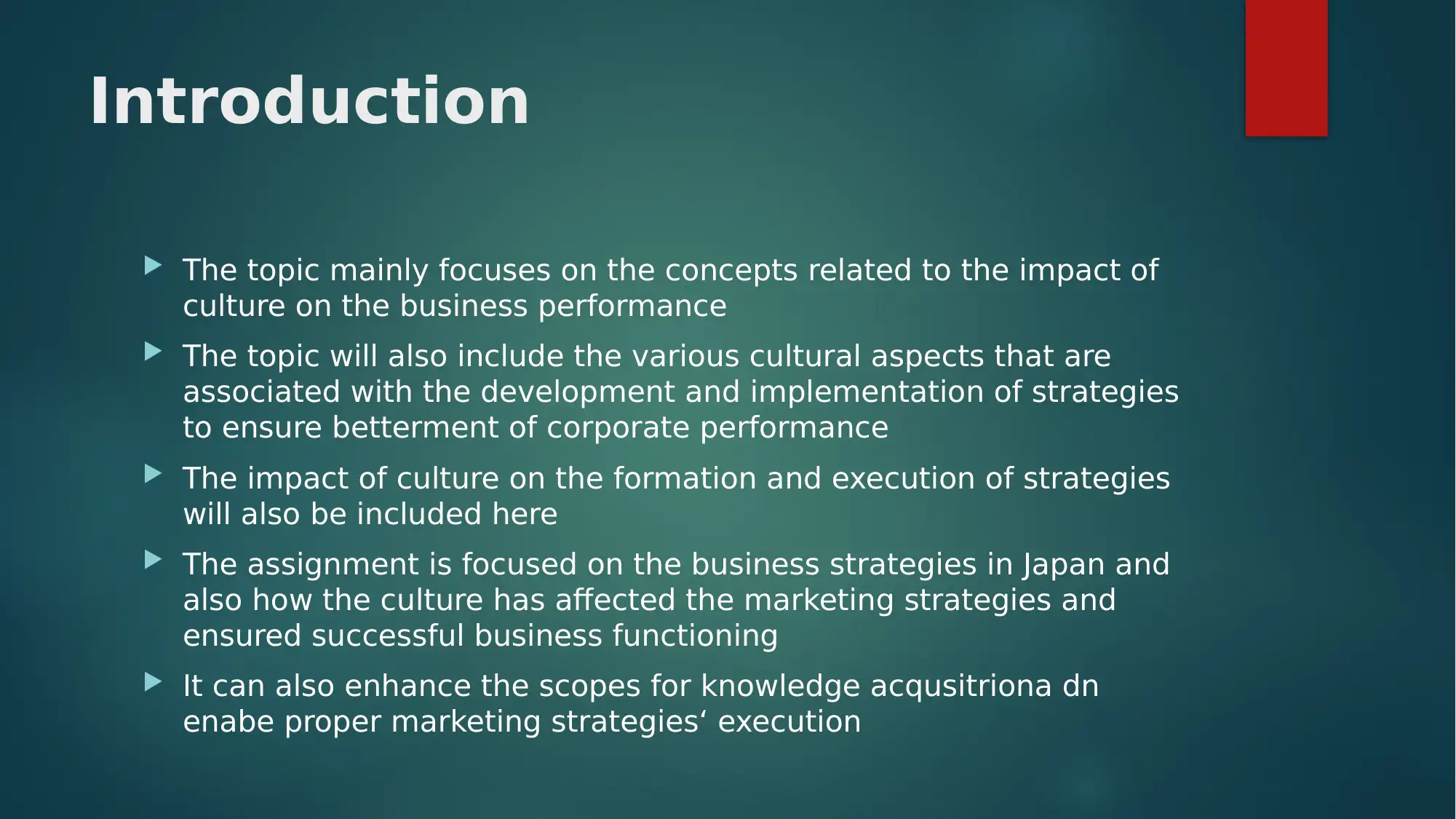
Introduction
The topic mainly focuses on the concepts related to the impact of
culture on the business performance
The topic will also include the various cultural aspects that are
associated with the development and implementation of strategies
to ensure betterment of corporate performance
The impact of culture on the formation and execution of strategies
will also be included here
The assignment is focused on the business strategies in Japan and
also how the culture has affected the marketing strategies and
ensured successful business functioning
It can also enhance the scopes for knowledge acqusitriona dn
enabe proper marketing strategies‘ execution
The topic mainly focuses on the concepts related to the impact of
culture on the business performance
The topic will also include the various cultural aspects that are
associated with the development and implementation of strategies
to ensure betterment of corporate performance
The impact of culture on the formation and execution of strategies
will also be included here
The assignment is focused on the business strategies in Japan and
also how the culture has affected the marketing strategies and
ensured successful business functioning
It can also enhance the scopes for knowledge acqusitriona dn
enabe proper marketing strategies‘ execution

Purpose of analysing the
articles
The analysis of the thee articles will provide an in-depth
understanding of the cultural aspects of business
The analysis will show how the maintenance of a positive culture
can lead to identification of goals in the future
It will assist in aligning the culture with the business practices for
creating a proper direction for the organisational value system
The leaders should also be responsible for using the analysis
results and integrate those into the business approaches
undertaken for the betterment of corporate performance.
articles
The analysis of the thee articles will provide an in-depth
understanding of the cultural aspects of business
The analysis will show how the maintenance of a positive culture
can lead to identification of goals in the future
It will assist in aligning the culture with the business practices for
creating a proper direction for the organisational value system
The leaders should also be responsible for using the analysis
results and integrate those into the business approaches
undertaken for the betterment of corporate performance.
⊘ This is a preview!⊘
Do you want full access?
Subscribe today to unlock all pages.

Trusted by 1+ million students worldwide
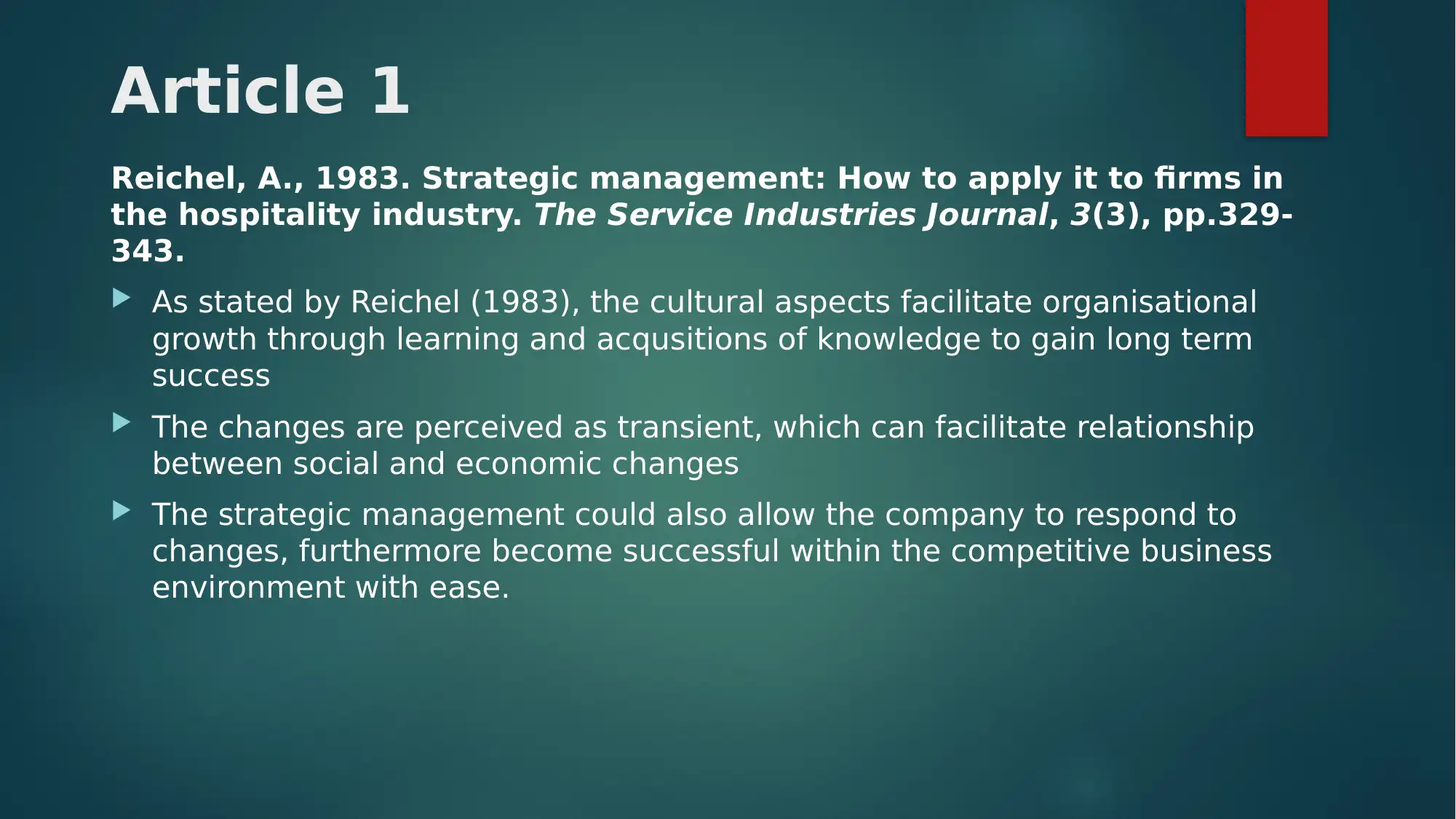
Article 1
Reichel, A., 1983. Strategic management: How to apply it to firms in
the hospitality industry. The Service Industries Journal, 3(3), pp.329-
343.
As stated by Reichel (1983), the cultural aspects facilitate organisational
growth through learning and acqusitions of knowledge to gain long term
success
The changes are perceived as transient, which can facilitate relationship
between social and economic changes
The strategic management could also allow the company to respond to
changes, furthermore become successful within the competitive business
environment with ease.
Reichel, A., 1983. Strategic management: How to apply it to firms in
the hospitality industry. The Service Industries Journal, 3(3), pp.329-
343.
As stated by Reichel (1983), the cultural aspects facilitate organisational
growth through learning and acqusitions of knowledge to gain long term
success
The changes are perceived as transient, which can facilitate relationship
between social and economic changes
The strategic management could also allow the company to respond to
changes, furthermore become successful within the competitive business
environment with ease.
Paraphrase This Document
Need a fresh take? Get an instant paraphrase of this document with our AI Paraphraser
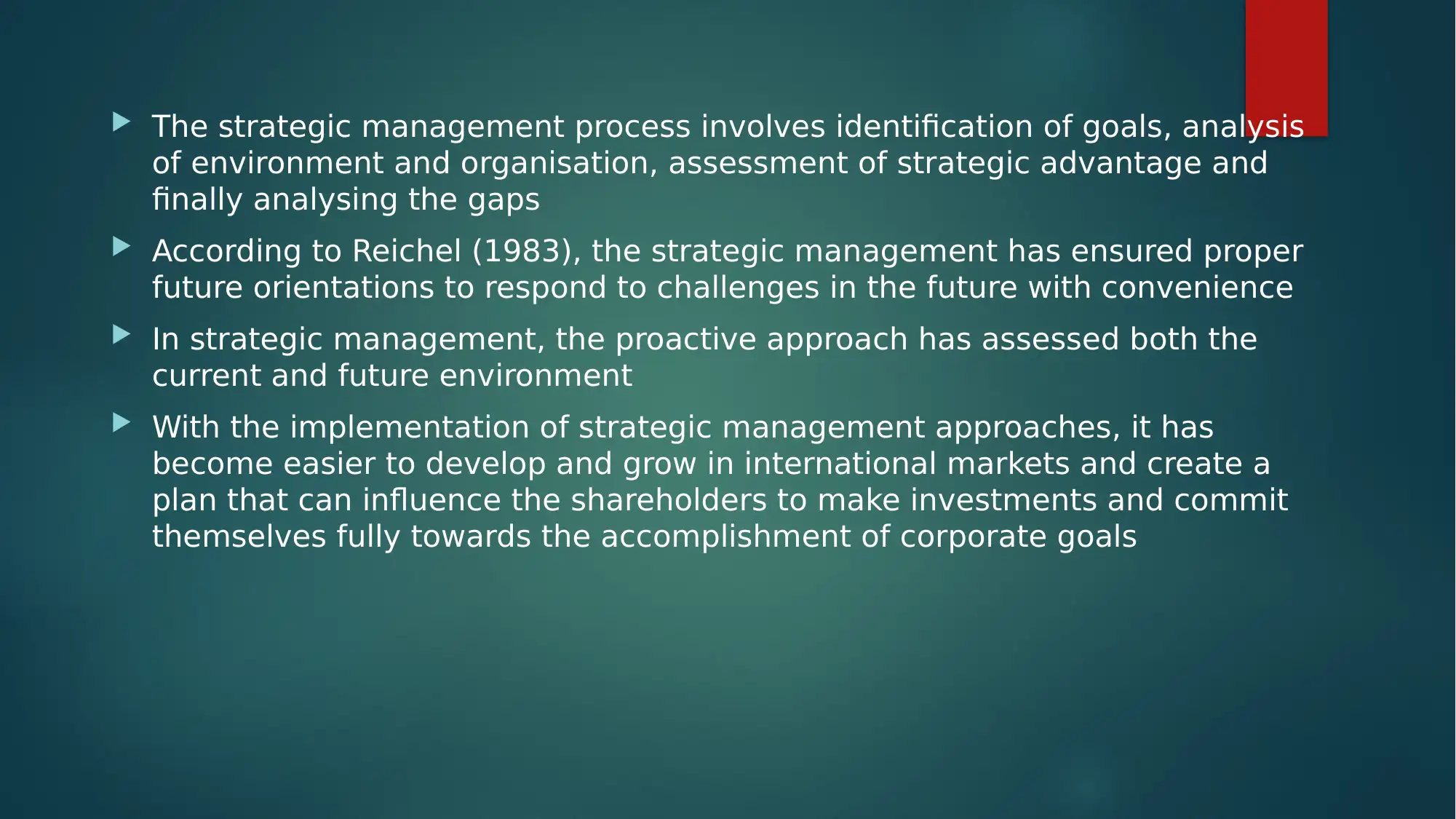
The strategic management process involves identification of goals, analysis
of environment and organisation, assessment of strategic advantage and
finally analysing the gaps
According to Reichel (1983), the strategic management has ensured proper
future orientations to respond to challenges in the future with convenience
In strategic management, the proactive approach has assessed both the
current and future environment
With the implementation of strategic management approaches, it has
become easier to develop and grow in international markets and create a
plan that can influence the shareholders to make investments and commit
themselves fully towards the accomplishment of corporate goals
of environment and organisation, assessment of strategic advantage and
finally analysing the gaps
According to Reichel (1983), the strategic management has ensured proper
future orientations to respond to challenges in the future with convenience
In strategic management, the proactive approach has assessed both the
current and future environment
With the implementation of strategic management approaches, it has
become easier to develop and grow in international markets and create a
plan that can influence the shareholders to make investments and commit
themselves fully towards the accomplishment of corporate goals
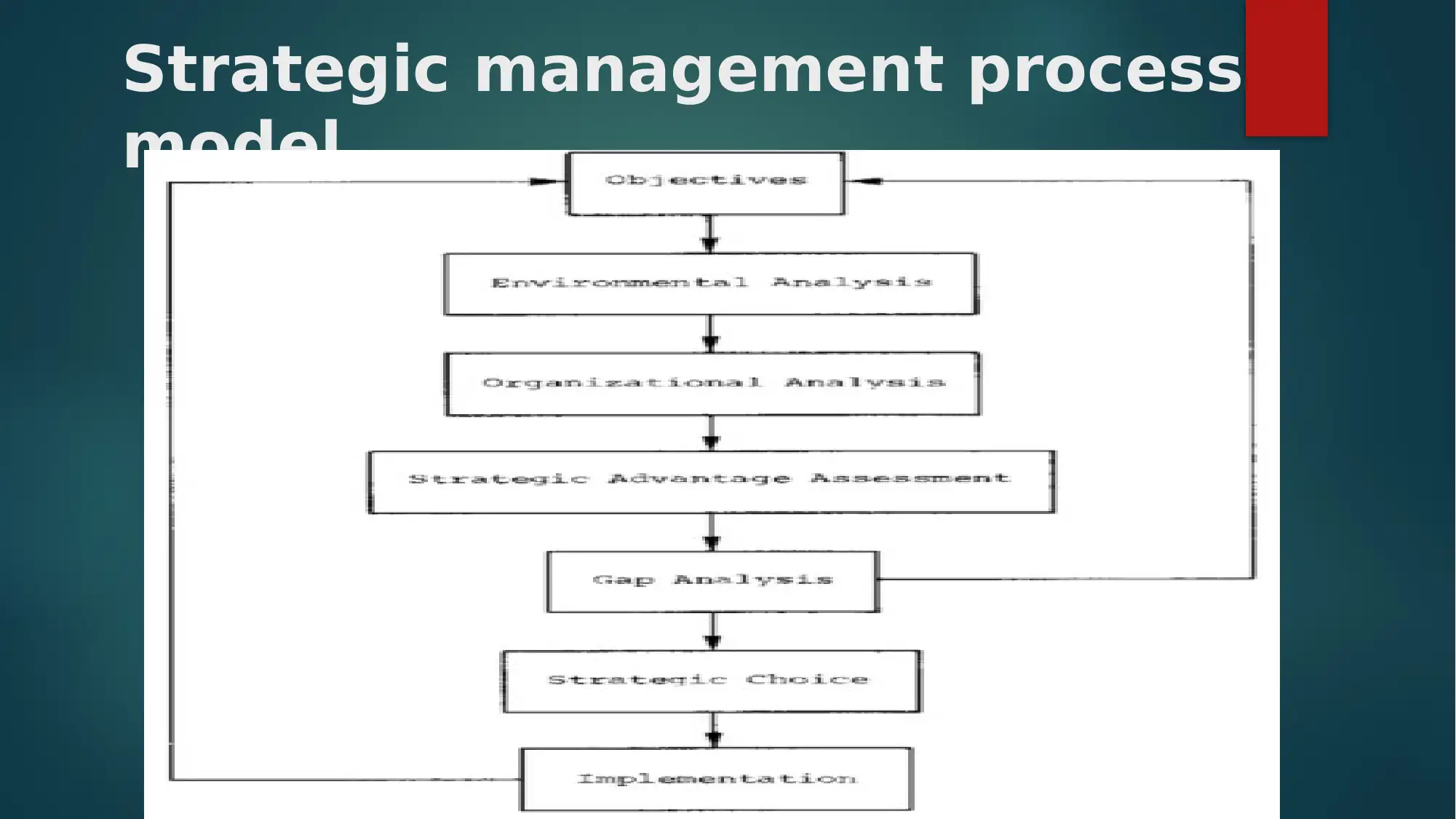
Strategic management process
model
model
⊘ This is a preview!⊘
Do you want full access?
Subscribe today to unlock all pages.

Trusted by 1+ million students worldwide

Article 2
Mehdi, M., Raza, S.H. and Raza, A., 2018. It’s What’s Inside: Impact of
Culture on Strategy Making. GSTF Journal on Business Review (GBR),
5(2).
Based on this article, the impact of culture is evident on the development of
strategies related to growth and development
A good working environment is established with the management of a positive
culture consisting of employees who manage the organisational values and
beliefs for doing things the right way
Considering the Hofstede’s cultural dimensions, there has been influence of
individual attitudes and behaviours that has enabled them to work by following
the guidelines, rules and regulations
Mehdi, M., Raza, S.H. and Raza, A., 2018. It’s What’s Inside: Impact of
Culture on Strategy Making. GSTF Journal on Business Review (GBR),
5(2).
Based on this article, the impact of culture is evident on the development of
strategies related to growth and development
A good working environment is established with the management of a positive
culture consisting of employees who manage the organisational values and
beliefs for doing things the right way
Considering the Hofstede’s cultural dimensions, there has been influence of
individual attitudes and behaviours that has enabled them to work by following
the guidelines, rules and regulations
Paraphrase This Document
Need a fresh take? Get an instant paraphrase of this document with our AI Paraphraser
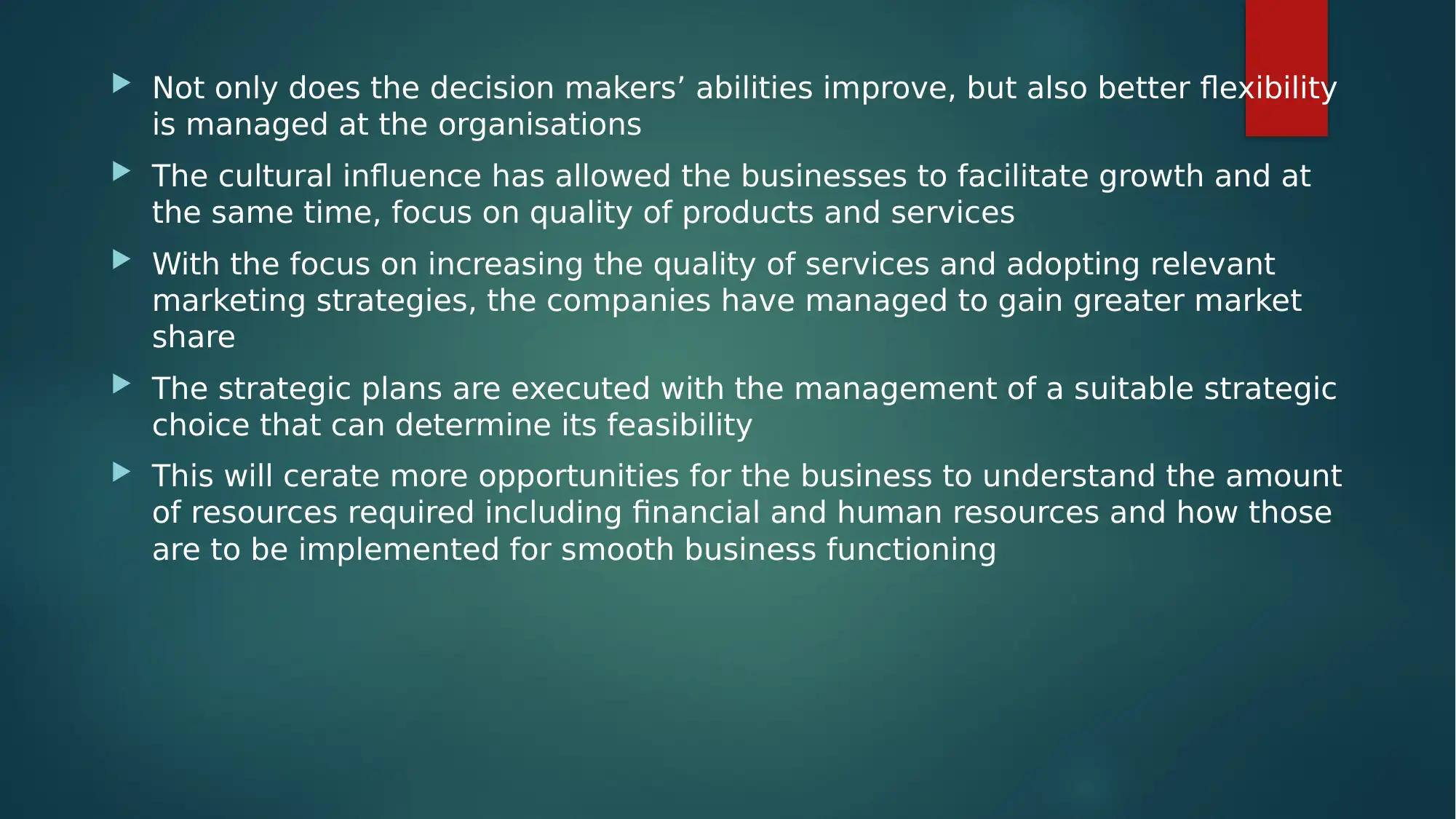
Not only does the decision makers’ abilities improve, but also better flexibility
is managed at the organisations
The cultural influence has allowed the businesses to facilitate growth and at
the same time, focus on quality of products and services
With the focus on increasing the quality of services and adopting relevant
marketing strategies, the companies have managed to gain greater market
share
The strategic plans are executed with the management of a suitable strategic
choice that can determine its feasibility
This will cerate more opportunities for the business to understand the amount
of resources required including financial and human resources and how those
are to be implemented for smooth business functioning
is managed at the organisations
The cultural influence has allowed the businesses to facilitate growth and at
the same time, focus on quality of products and services
With the focus on increasing the quality of services and adopting relevant
marketing strategies, the companies have managed to gain greater market
share
The strategic plans are executed with the management of a suitable strategic
choice that can determine its feasibility
This will cerate more opportunities for the business to understand the amount
of resources required including financial and human resources and how those
are to be implemented for smooth business functioning
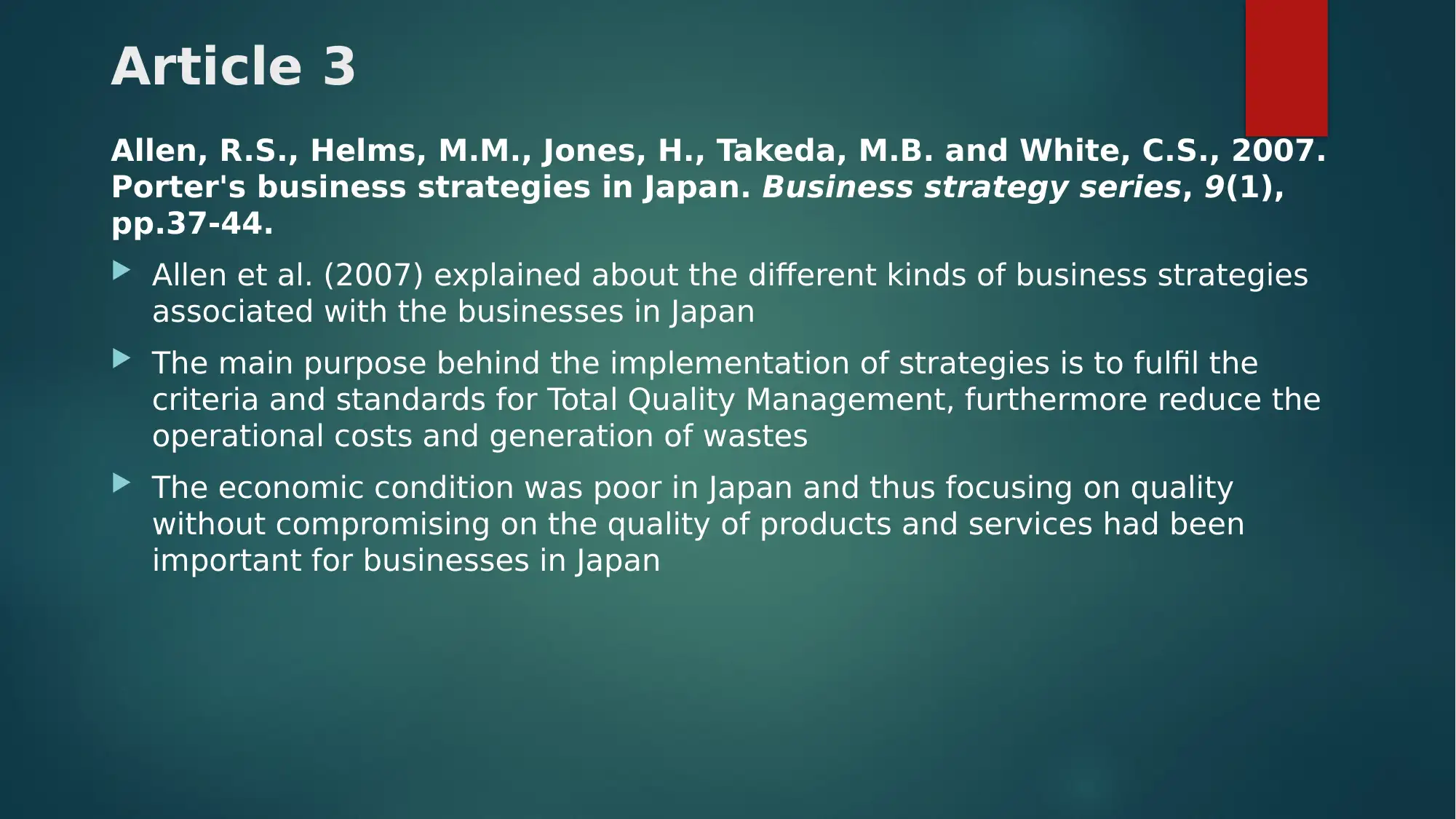
Article 3
Allen, R.S., Helms, M.M., Jones, H., Takeda, M.B. and White, C.S., 2007.
Porter's business strategies in Japan. Business strategy series, 9(1),
pp.37-44.
Allen et al. (2007) explained about the different kinds of business strategies
associated with the businesses in Japan
The main purpose behind the implementation of strategies is to fulfil the
criteria and standards for Total Quality Management, furthermore reduce the
operational costs and generation of wastes
The economic condition was poor in Japan and thus focusing on quality
without compromising on the quality of products and services had been
important for businesses in Japan
Allen, R.S., Helms, M.M., Jones, H., Takeda, M.B. and White, C.S., 2007.
Porter's business strategies in Japan. Business strategy series, 9(1),
pp.37-44.
Allen et al. (2007) explained about the different kinds of business strategies
associated with the businesses in Japan
The main purpose behind the implementation of strategies is to fulfil the
criteria and standards for Total Quality Management, furthermore reduce the
operational costs and generation of wastes
The economic condition was poor in Japan and thus focusing on quality
without compromising on the quality of products and services had been
important for businesses in Japan
⊘ This is a preview!⊘
Do you want full access?
Subscribe today to unlock all pages.

Trusted by 1+ million students worldwide
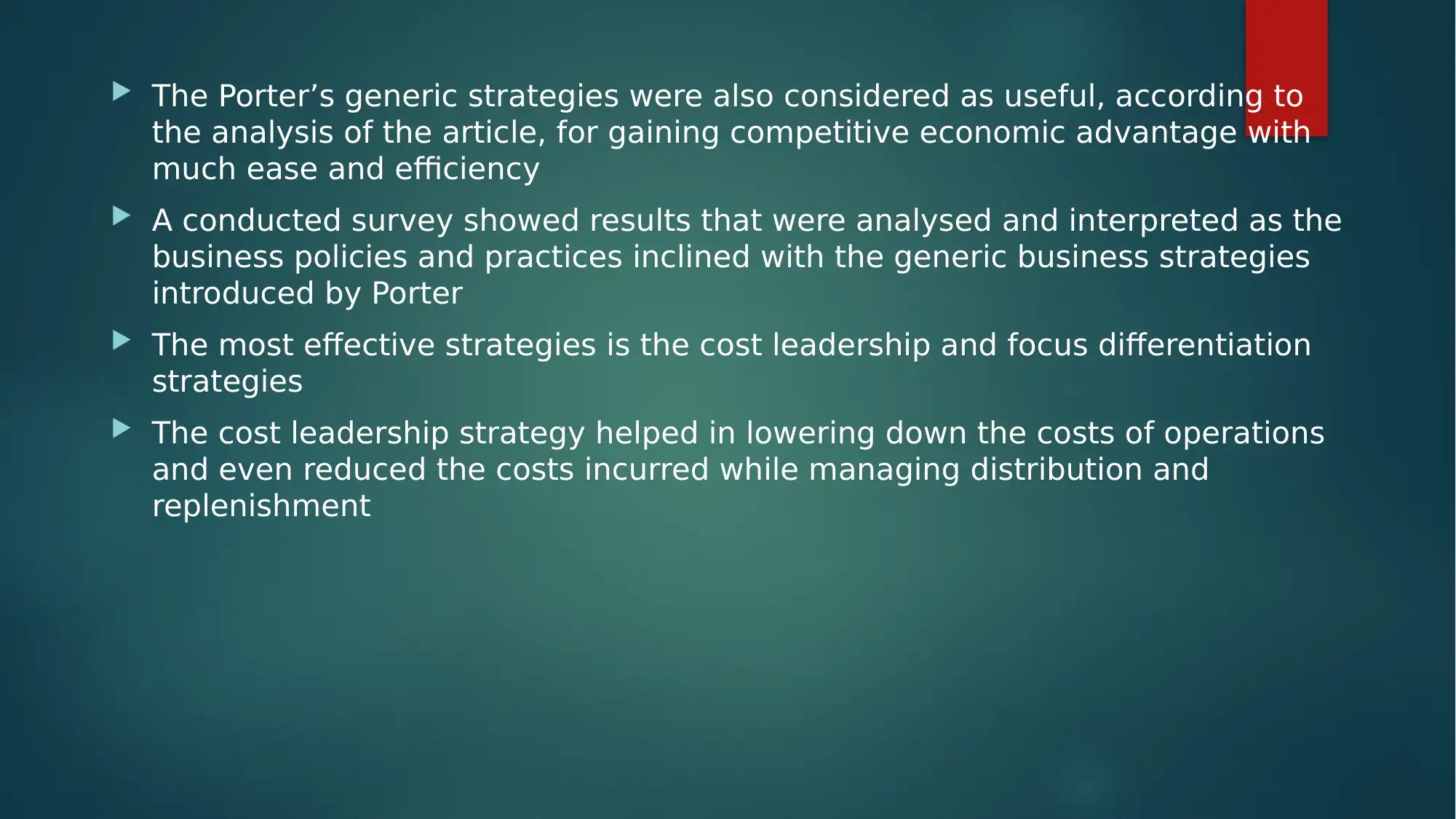
The Porter’s generic strategies were also considered as useful, according to
the analysis of the article, for gaining competitive economic advantage with
much ease and efficiency
A conducted survey showed results that were analysed and interpreted as the
business policies and practices inclined with the generic business strategies
introduced by Porter
The most effective strategies is the cost leadership and focus differentiation
strategies
The cost leadership strategy helped in lowering down the costs of operations
and even reduced the costs incurred while managing distribution and
replenishment
the analysis of the article, for gaining competitive economic advantage with
much ease and efficiency
A conducted survey showed results that were analysed and interpreted as the
business policies and practices inclined with the generic business strategies
introduced by Porter
The most effective strategies is the cost leadership and focus differentiation
strategies
The cost leadership strategy helped in lowering down the costs of operations
and even reduced the costs incurred while managing distribution and
replenishment
Paraphrase This Document
Need a fresh take? Get an instant paraphrase of this document with our AI Paraphraser
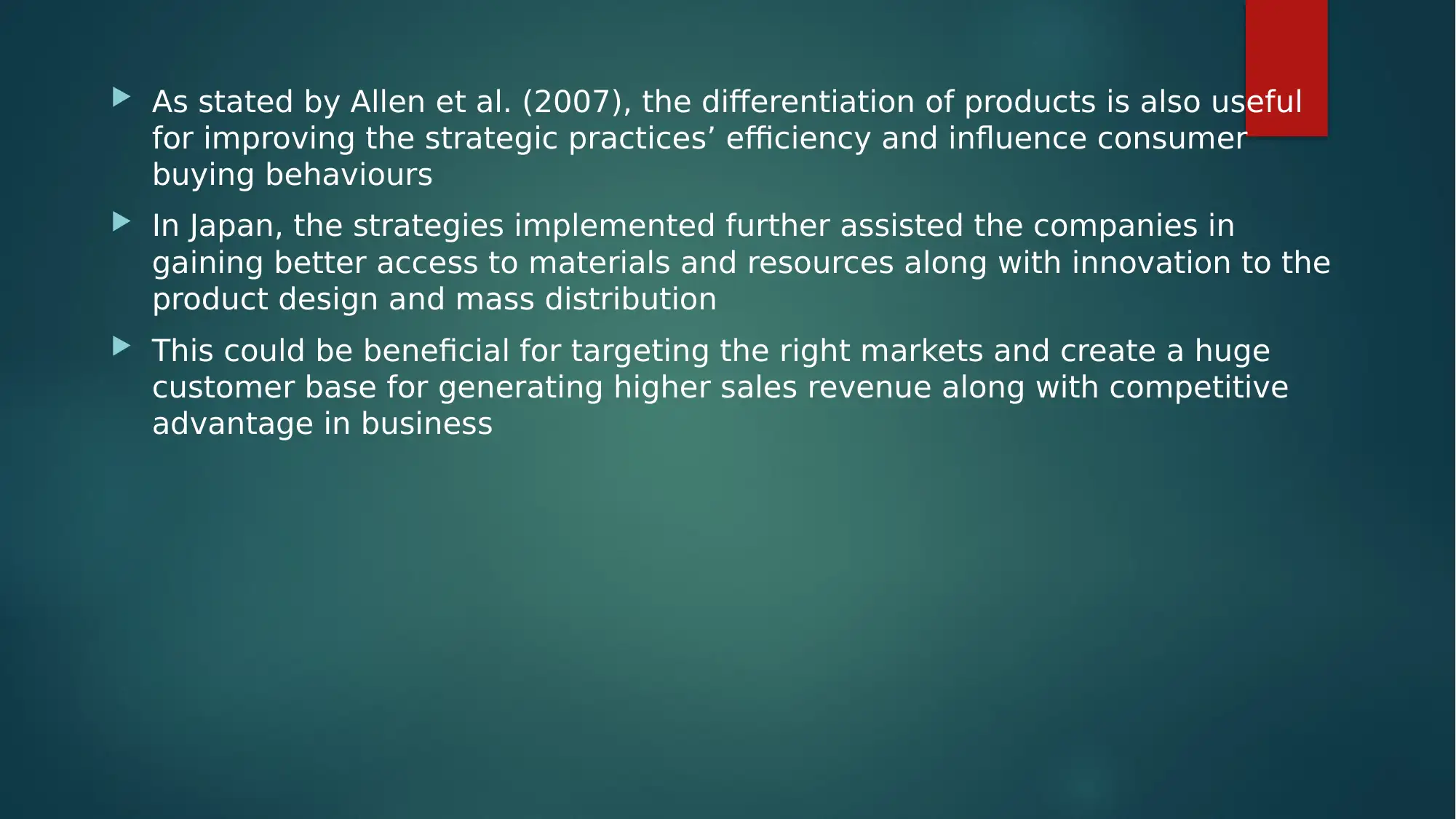
As stated by Allen et al. (2007), the differentiation of products is also useful
for improving the strategic practices’ efficiency and influence consumer
buying behaviours
In Japan, the strategies implemented further assisted the companies in
gaining better access to materials and resources along with innovation to the
product design and mass distribution
This could be beneficial for targeting the right markets and create a huge
customer base for generating higher sales revenue along with competitive
advantage in business
for improving the strategic practices’ efficiency and influence consumer
buying behaviours
In Japan, the strategies implemented further assisted the companies in
gaining better access to materials and resources along with innovation to the
product design and mass distribution
This could be beneficial for targeting the right markets and create a huge
customer base for generating higher sales revenue along with competitive
advantage in business
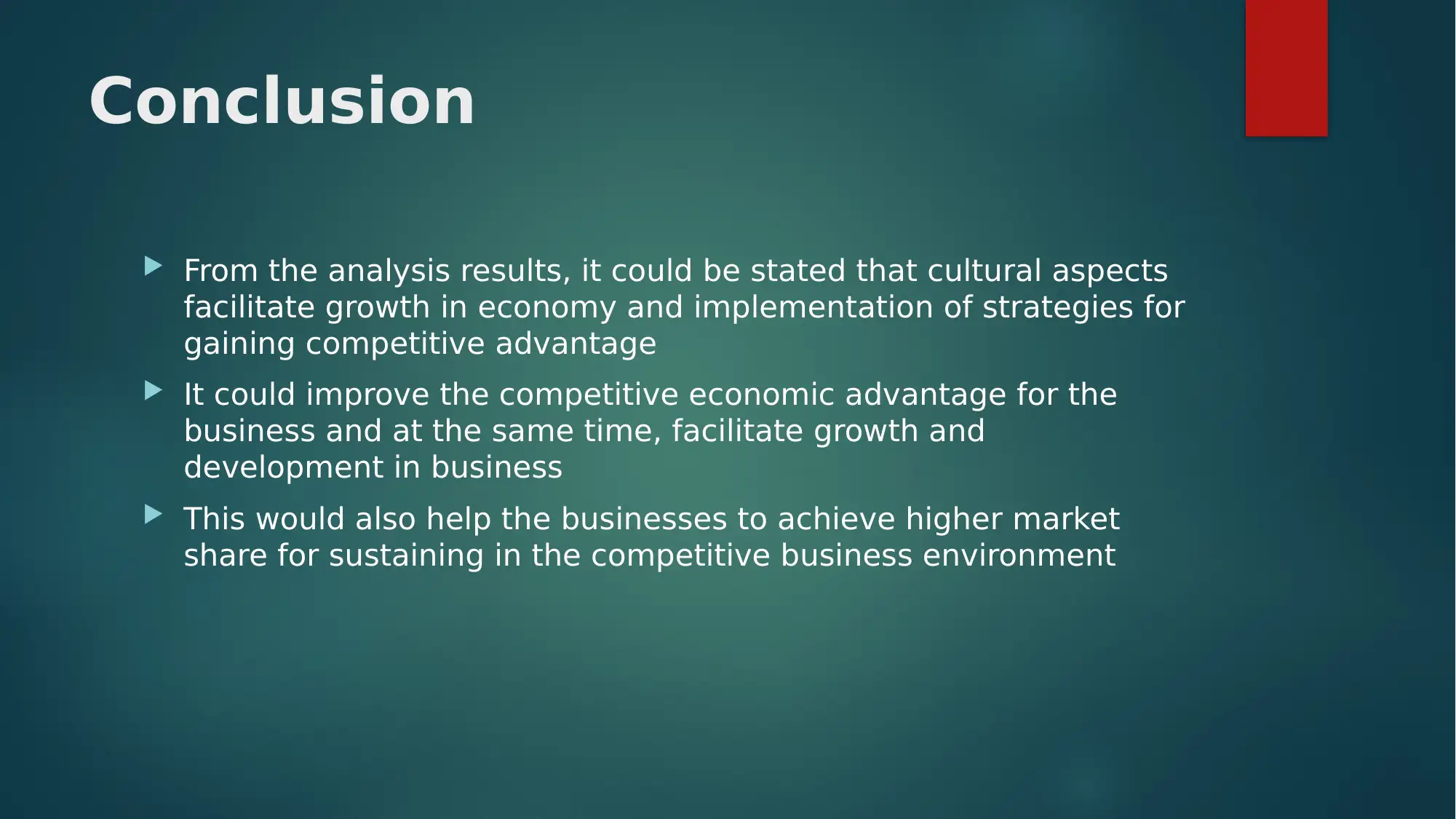
Conclusion
From the analysis results, it could be stated that cultural aspects
facilitate growth in economy and implementation of strategies for
gaining competitive advantage
It could improve the competitive economic advantage for the
business and at the same time, facilitate growth and
development in business
This would also help the businesses to achieve higher market
share for sustaining in the competitive business environment
From the analysis results, it could be stated that cultural aspects
facilitate growth in economy and implementation of strategies for
gaining competitive advantage
It could improve the competitive economic advantage for the
business and at the same time, facilitate growth and
development in business
This would also help the businesses to achieve higher market
share for sustaining in the competitive business environment
⊘ This is a preview!⊘
Do you want full access?
Subscribe today to unlock all pages.

Trusted by 1+ million students worldwide
1 out of 14
Related Documents
Your All-in-One AI-Powered Toolkit for Academic Success.
+13062052269
info@desklib.com
Available 24*7 on WhatsApp / Email
![[object Object]](/_next/static/media/star-bottom.7253800d.svg)
Unlock your academic potential
Copyright © 2020–2026 A2Z Services. All Rights Reserved. Developed and managed by ZUCOL.



